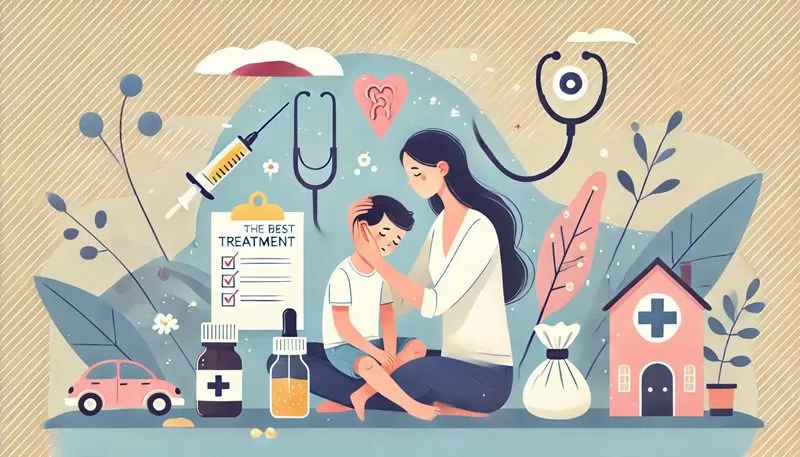Table of Contents
Best Treatment Ear Infection Children
Ear infections are a common issue for children, and as a parent, it’s important to know how to handle them. Whether your child is experiencing mild discomfort or more severe symptoms, understanding the best treatment options is key to ensuring they recover quickly and comfortably. In this article, we’ll explore various treatments, symptoms, and prevention tips for ear infections in children, and provide helpful suggestions for managing them at home. We’ll also introduce some valuable products from [your store] that can aid in managing your child’s ear infection.
When it comes to treating ear infections in children, it’s essential to understand the most effective options available to help your little one recover quickly. One of the best treatments for ear infections in children often includes a combination of prescribed medication and home remedies to ease discomfort. For more detailed guidance on treating pediatric ear infections, visit the Mayo Clinic’s comprehensive resource.
What is an Ear Infection (Otitis Media): Symptoms, Causes & Treatment?
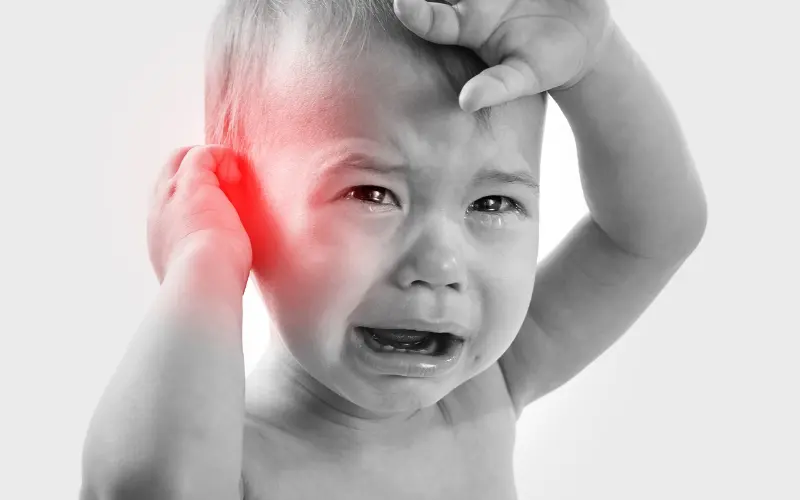
An ear infection, also known as otitis media, occurs when the middle ear becomes inflamed due to fluid buildup, often caused by bacteria or viruses. This condition is particularly common in children, as their Eustachian tubes are smaller and more prone to blockages.
Symptoms of an ear infection include:
- Ear pain or discomfort
- Trouble sleeping or lying flat
- Fussiness or irritability
- Tugging or pulling at the ear
- Fluid draining from the ear
- Difficulty hearing
If you suspect your child has an ear infection, it’s important to seek medical advice for proper diagnosis. However, many mild infections can be managed at home with the right tools and care. Our Ear Infection Relief Drops can be a soothing option to help alleviate discomfort and pain associated with ear infections.
Dealing with ear infections in children can be stressful, especially when they disrupt sleep patterns. Sleep deprivation is a common concern for parents during these challenging times. It’s important to prioritize your rest and find effective strategies to cope with the exhaustion that comes with caring for a sick child. For helpful tips on managing sleep deprivation, check out our article on How to Deal With Sleep Deprivation After Baby. This resource provides insights on improving your sleep quality, even when your little one is under the weather.
Can You Treat Baby Ear Infection Without Antibiotics?

In many cases, yes, you can. Mild ear infections may resolve on their own without the need for antibiotics, especially if they are caused by a virus. Many doctors recommend a “wait-and-see” approach for 48 to 72 hours before prescribing antibiotics, as overuse of antibiotics can lead to resistance. If your child’s symptoms are mild and not worsening, there are natural remedies and over-the-counter solutions that can provide relief.
Using a warm compress or pain-relieving drops like our Natural Earache Relief Drops can help soothe the pain. Make sure your child is staying hydrated and elevated while resting, as this helps drain the fluid from the middle ear. However, if symptoms persist or worsen, consult a healthcare professional.
When caring for children, managing various health concerns goes hand in hand. Just as ear infections can be a common issue, parents also often face challenges with diaper blowouts and leaks. Understanding how to effectively manage these situations can make a significant difference in your child’s comfort and your peace of mind. For practical tips and strategies to handle diaper blowouts and leaks, check out our guide on Managing Diaper Blowouts and Leaks. This resource will provide valuable insights on preventing and addressing these common occurrences, ensuring your child stays comfortable and dry.
Managing Ear Infections in Babies at Home
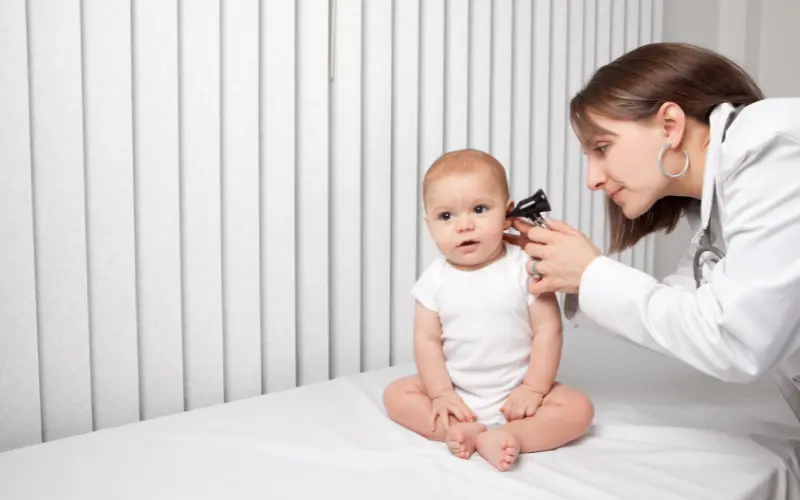
Managing your baby’s ear infection at home can seem daunting, but with the right care and products, it can be done effectively. Here are a few tips:
- Elevate Your Baby’s Head: Keep your baby’s head slightly elevated while they sleep to help reduce fluid buildup in the middle ear. A reclined position can help ease the discomfort caused by pressure in the ear.
- Warm Compress: Applying a warm compress to the affected ear for 10-15 minutes can soothe pain and reduce inflammation. This is a simple and effective way to manage mild symptoms.
- Pain Relief: Over-the-counter pain relievers like acetaminophen or ibuprofen can be helpful in reducing pain and fever. Make sure to consult your pediatrician before giving any medication.
Our Baby Ear Thermometer can also be a great tool to monitor your baby’s temperature and ensure there are no complications from the infection.
When considering the overall health of your child, it’s important to be aware of various conditions that may arise, such as jaundice in newborns. This condition, which can manifest shortly after birth, is characterized by yellowing of the skin and eyes and may require careful monitoring and treatment. Understanding the symptoms, causes, and treatment options for jaundice can help parents make informed decisions about their child’s health. For more detailed information on this topic, you can read our article on Jaundice in Newborns – Symptoms, Causes, and Treatment.
When to Seek Medical Help

While many ear infections resolve on their own, there are times when medical intervention is necessary. Seek medical advice if:
- Your baby is younger than 6 months and showing signs of an ear infection.
- Symptoms worsen after 48 hours or persist beyond 72 hours.
- There is pus or blood draining from the ear.
- Your child has repeated ear infections or persistent hearing problems.
Preventing Future Ear Infections
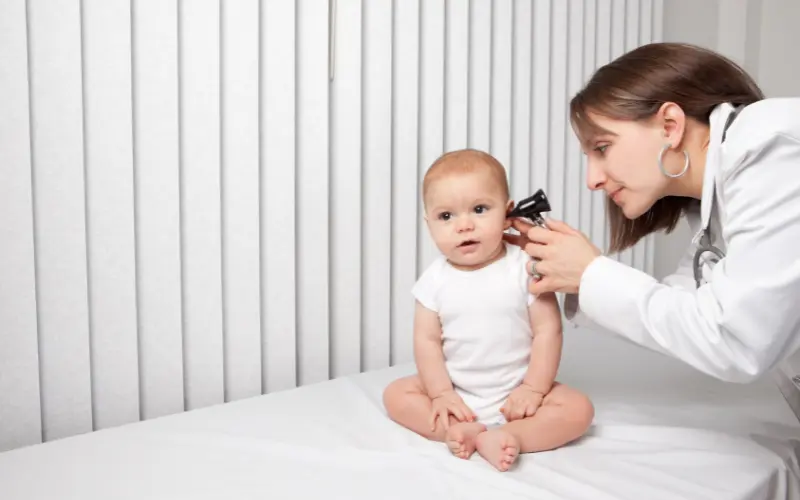
Prevention is always better than cure. While some ear infections can’t be avoided, there are steps you can take to reduce your child’s risk:
- Breastfeed: Studies show that breastfeeding helps boost your baby’s immune system, making them less prone to infections.
- Keep them upright during feedings: Holding your baby upright during bottle feedings can reduce fluid buildup in the Eustachian tubes.
- Avoid smoke exposure: Secondhand smoke can irritate the Eustachian tubes, making infections more likely.
- Vaccinations: Keep your child’s vaccinations up to date, especially the pneumococcal and flu vaccines, as they help prevent the infections that can lead to ear problems.
Ear Infection (Otitis Media): Symptoms, Causes & Treatment – Key Takeaways
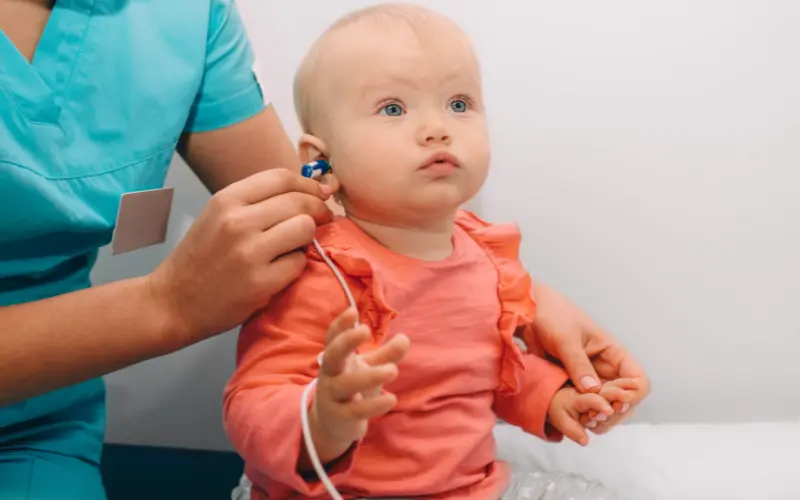
Ear infections, while uncomfortable, are a common part of childhood. With proper treatment and care, your child can recover quickly. Be mindful of the symptoms and know when to treat at home and when to seek medical help. Keep essentials like our Natural Earache Relief Drops, Baby Ear Thermometer, and Ear Infection Relief Drops on hand for immediate relief when symptoms arise.
Traveling with a baby can be both exciting and challenging, and having the right gear can make all the difference in ensuring a smooth journey. When planning your next trip, it’s essential to consider items that will keep your little one comfortable and entertained. From portable cribs and diaper bags to travel-friendly high chairs and car seats, each piece of gear plays a vital role in making your travels hassle-free. To learn more about how to travel with a baby and discover the essential gear you’ll need, check out our detailed guide on How to travel with a baby, and the gear you need.
Can You Treat Baby Ear Infection Without Antibiotics? – Final Thoughts
So, can you treat baby ear infection without antibiotics? In many cases, the answer is yes, especially if the infection is mild or caused by a virus. Managing the symptoms at home using natural remedies and over-the-counter products can be effective in most cases. However, it’s essential to keep an eye on your baby’s symptoms and consult a healthcare provider if there are any concerns.
By understanding ear infection (otitis media): symptoms, causes & treatment, you’ll be better equipped to handle ear infections with confidence. Managing ear infections in babies is about providing comfort, monitoring symptoms, and knowing when to seek medical intervention.
Managing Ear Infections in Babies requires a combination of the right products, patience, and attentive care. Make sure you have the necessary tools, like our Baby Ear Thermometer, Natural Earache Relief Drops, and Ear Infection Relief Drops, to ensure your baby’s comfort and speedy recovery.

